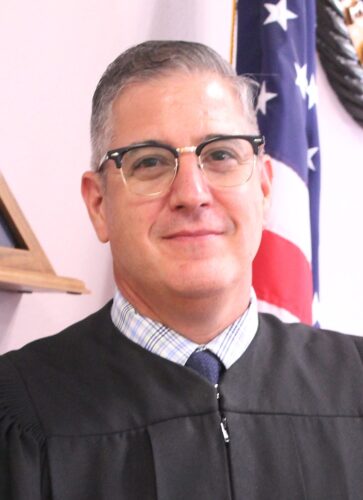Court Report
Last year, the Legislature approved and, the governor signed into law, the removal of fees assessed on people convicted in criminal and traffic cases. The law had a delayed implementation until July of this year to allow governmental agencies and programs that receive these fees to develop their budget requests appropriately.
Fines are different from the fees on court cases, and fines are not going away. Fines are part of sentences decided by a judge to deter, rehabilitate or punish an offender.

Judge John Chavez
Court fees were established by the Legislature as a user fee to fund certain governmental operations and programs, including some in courts, rather than financing those services through general tax dollars that pay for schools and most of state government.
Collected in amounts ranging from $1 to $85, these fees fund a variety of activities from part of the cost of juries and services for people with traumatic brain injuries to training for county and juvenile detention officers.
On the surface, the fee funding was intended to have people who commit a crime help pay for the criminal justice system. However, when you dig just a little deeper, problems with these fees become evident.
Court fees are not a reliable funding source because it is uncertain how many traffic citations will be issued or how many people will be convicted of criminal offenses each year. As a result, courts and other governmental programs cannot realistically budget when they do not know how much revenue will be generated from fees on a year-to-year basis. For example, large swings in court fee income undermined the ability to provide routine and standardized judicial education.
Court fees sometimes have a limited connection to the offense charged. What does a $5 jury and witness fee have to do with a citation for not being in possession of your driver’s license? There is no right to a jury in traffic cases in which the only penalty is a fine.
Fees may exceed the fine imposed as punishment for an offense. The lowest combined fees of $61 assessed on someone convicted of a traffic violation is greater than the lowest $25 speeding fine.
Court fees can detract from more important probation considerations. Hundreds of dollars in court fees can become the principal focus of someone on probation instead of attending a driver improvement school or obtaining valid insurance, which will produce greater benefits to the community and the defendant.
Many more examples exist. However, the point of this column is not to sell you on the idea of this legislation. By law, on July 1 court fees will no longer be part of a criminal conviction.
The purpose of this column is to prepare people for changes to sentencing practices especially as they relate to traffic cases. Court fees play a large part in the traffic sentencing equation; judges balance these with fines and other probation considerations.
When I took the bench ten years ago, my mentor explained to me that I would develop a “strike zone” over time. In such a way, barring some unforeseen factor, a judge’s sentencing, while nuanced to each situation, should be predictable. That strike zone takes about a year to establish and may vary slightly based on changing conditions.
The removal of court fees is a significant change to conditions, especially regarding traffic matters where court fees play an influential role in the overall resolution of cases. As such, individual judges will rebalance fines and probation requirements in response to these changes.
It is important to underscore that cases decided through June 30 will still have court fees imposed. Unless otherwise modified by a court, those fees are due according to established payment plans.
Fees associated with bench warrants will also go away July 1. Currently, an additional $100 is assessed every time a court issues a bench warrant. When it comes to failure to pay warrants, an individual who was unable to pay the lowest court fee of $61 now owes $161.
Under the new law, failure to pay warrants will only be issued if someone fails to pay a fine decided as part of a sentence, and the extra $100 fee will no longer apply.
As part of the same legislative action, and implemented last June, options for community service were increased. In short, educational endeavors and participation in rehabilitative programs are valid community service options in lieu of paying the court.
With the July 1 court fee elimination, the law and its intent will take full effect. I suspect that the changes will have positive results on individuals charged with traffic offenses.
I also suspect that these changes will refocus traffic offenders toward rehabilitative efforts such as driver improvement school, community service, or donations. These have the benefit of either reframing a driver’s understanding of their responsibilities on the road or changing the focus from themselves to their community.
Of course, the best way to avoid court fees or fines is to avoid a traffic citation. This includes what I call the five driver responsibilities. Be licensed. Drive a safe vehicle. Drive a registered vehicle. Have insurance. Abide by traffic laws.
Please be kind to one another on the road. Everyone is trying to get somewhere, and everyone deserves to safely arrive at their destination.
(Magistrate Judge John R. Chavez is the magistrate in Belen. He is a native of Valencia County and is a retired U.S. Army colonel.)

Judge John Chavez, guest columnist
Magistrate Judge John R. Chavez is the magistrate in Belen. He is a native of Valencia County and is a retired U.S. Army colonel.
















